Category:Scraping Tools
Top 6 ScraperAPI Alternatives for Web Scraping in 2026

Lead Software Engineer
ScraperAPI's slow response times and expensive pricing might be killing your scraping budget.
At 15.7 seconds per request and $8.49 per 1,000 requests, you're paying premium prices for non-optimal performance on a lot of domains.
Here are 6 alternatives that deliver better speed, lower costs, and comparable reliability without the pricing surprises.
| API Name | Avg. Success Rate | Avg. Response Time | Starting Price | Avg. Price per 1K |
|---|---|---|---|---|
| ScraperAPI | 92.70% | 15.7s | $49 | $8.49 |
| Scrape.do | 98.19% | 4.7s | $29 | $0.80 |
| Bright Data | 98.44% | 10.6s | $75 | $1.50 |
| ZenRows | 92.64% | 10.0s | $69 | $4.48 |
| ScrapingBee | 92.69% | 11.7s | $49 | $3.90 |
| Oxylabs | 92.52% | 17.5s | $75 | $6.39 |
| Octoparse AI | N/A (visual RPA) | N/A (visual RPA) | Free | Pay-as-you-go |
The table above compares ScraperAPI with six alternatives. The first five are based on independent benchmark data from the best web scraping APIs; run across Amazon, Indeed, GitHub, Zillow, Capterra, Google, and X (Twitter). Octoparse AI is included as a different approach—a visual RPA tool rather than a traditional scraping API.
What ScraperAPI Does Well
Before we cover alternatives, here's where ScraperAPI actually delivers value.
Good Success Rate on E-commerce
ScraperAPI achieved 92.70% average success rate in testing, which puts it in the solid middle tier for reliability.
It works consistently on mainstream e-commerce platforms and developer sites without the catastrophic failures you see from budget providers.
Pre-built Templates
ScraperAPI includes templates for common use cases like SERP and e-commerce scraping that handle pagination, rate limiting, and data extraction patterns automatically.
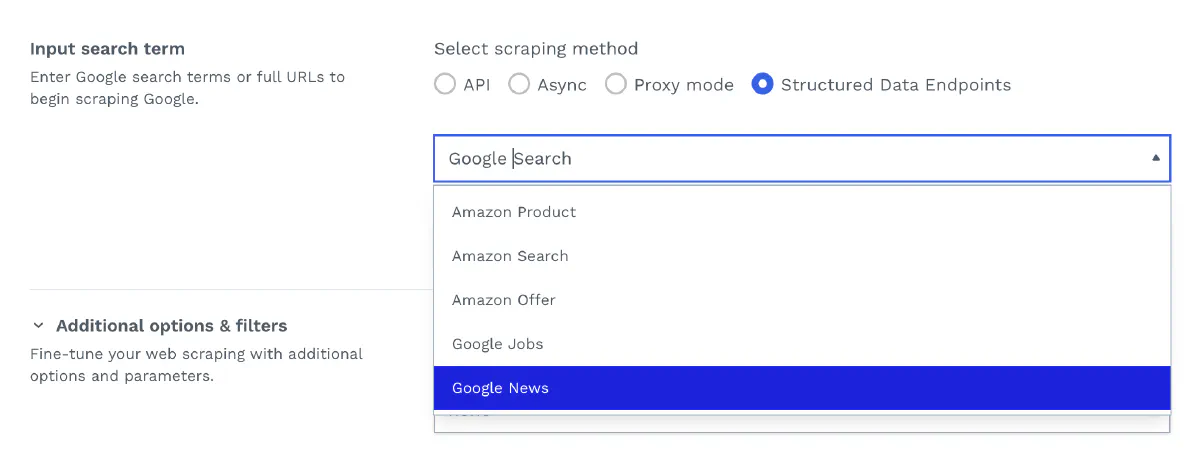
These templates save you from building code from scratch, especially useful if you're new to web scraping.
Downsides of ScraperAPI
The success rate looks decent, but ScraperAPI has two major problems that make it expensive for serious scraping operations.
Slow Response Times
ScraperAPI averaged 15.7 seconds per request in testing, making it one of the slowest providers available.
When you're scraping thousands of pages, that speed penalty cuts your throughput significantly and increases your overall costs.
Most Expensive per 1K
At $8.49 average cost per 1,000 requests, ScraperAPI costs more than every other provider tested.
This is mainly because for tougher target URLs you'll need to enable their super premium proxies.
Certain domains can spike to much higher costs, making it prohibitively expensive for protected sites where you need the most help.
1. Scrape.do
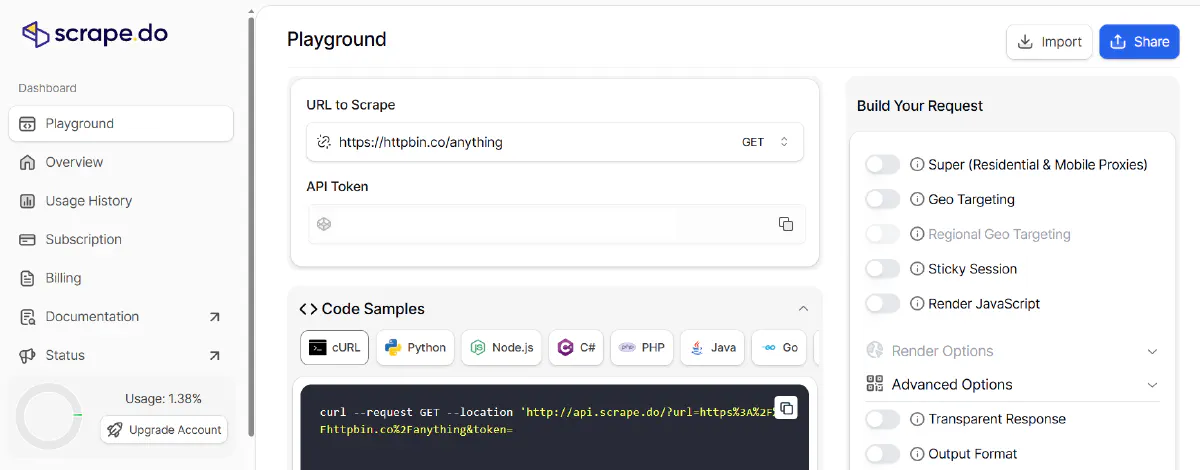
Scrape.do delivers the fastest response times and highest success rates in the industry.
It combines unmatched speed with 98+% success rate and transparent pricing that doesn't surprise you with hidden costs.
The main limitation is that it doesn't offer pre-built templates for specific platforms like ScraperAPI does.
Pros
- Unmatched speed and reliability: 98.19% success rate with 4.7s average response time according to independent testing
- Generous freemium plan: 1,000 requests monthly for free with no credit card required
- Transparent pricing: Large plans available at affordable rates without hidden multipliers
Cons
- Missing platform-specific APIs: No pre-built templates for SERP or e-commerce like ScraperAPI offers
ScraperAPI vs Scrape.do
Scrape.do is significantly faster and more reliable with transparent pricing that won't surprise you.
ScraperAPI has pre-built templates that can save development time for common use cases.
Check in-depth comparison of Scrape.do vs ScraperAPI or start free with Scrape.do and see the difference for yourself.
2. Oxylabs
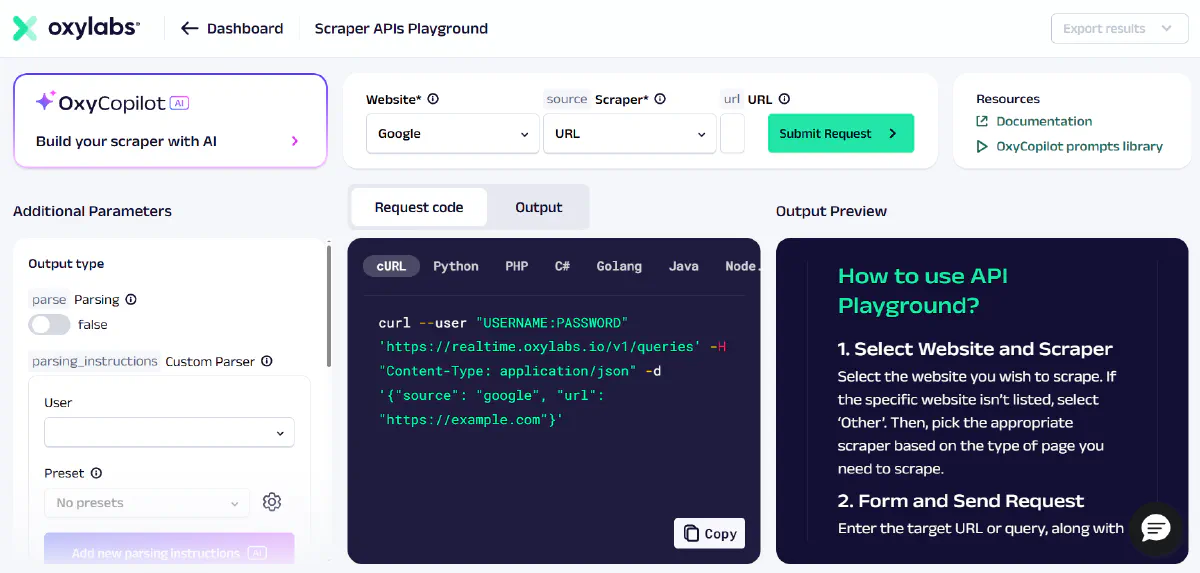
Oxylabs offers enterprise-grade infrastructure with a massive proxy network covering every possible use case.
It delivers solid 92.52% success rates with various products designed for different scraping needs. However, the bandwidth-based pricing model makes it difficult to predict costs, and the $75/month starting price is steep for smaller operations.
Pros
- Solid success rate: 92.52% average success rate across all tested domains
- Comprehensive proxy network: Various products and huge proxy network covering all geographic regions and use cases
Cons
- Bandwidth-based pricing: Charges by bandwidth instead of successful requests, making cost prediction difficult
- High starting price: $75/month for just 8GB, which translates to roughly 20K requests with rendering enabled
ScraperAPI vs Oxylabs
Oxylabs has better pricing for large-scale operations once you understand the bandwidth model.
ScraperAPI has more predictable per-request pricing that's easier to budget for.
Both have similar success rates but completely different pricing approaches.
3. ScrapingBee
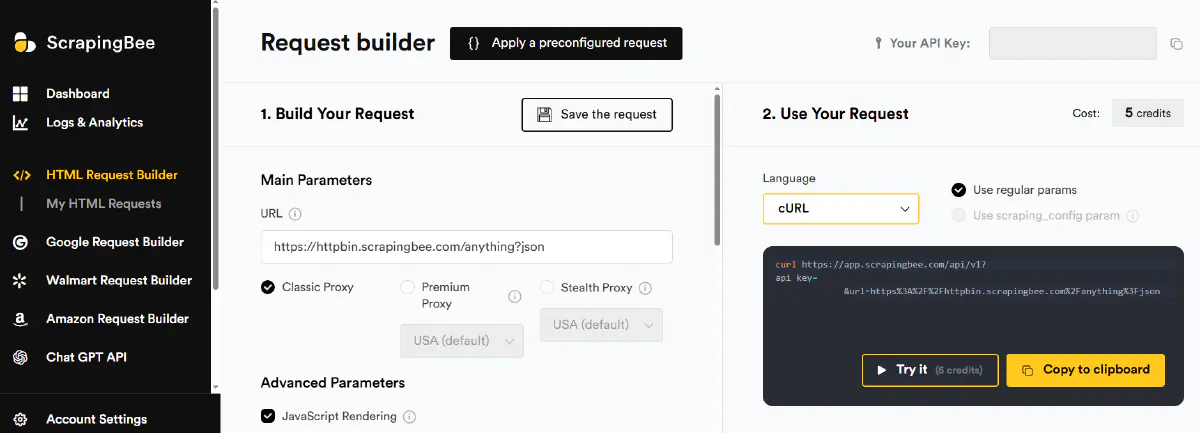
ScrapingBee combines reliable scraping with AI-powered data extraction capabilities.
It achieves 92.69% success rate and works on almost every popular website with its AI extraction engine that accepts plain-English instructions. However, it's slower than other alternatives at 11.7s average response time, and while the base price is $0.20 per 1K requests, it can spike to $15 for some popular domains.
Pros
- Strong success rate: 92.69% success rate works reliably on almost every popular website
- AI-powered extraction: Has an AI extraction engine that accepts plain-English instructions for data parsing
Cons
- Slower performance: 11.7s average response time is slower compared to other alternatives
- Unpredictable pricing spikes: Base price of $0.20 per 1K can jump to $15 for popular domains
ScraperAPI vs ScrapingBee
ScrapingBee has AI extraction capabilities that can save significant development time.
ScraperAPI has pre-built templates for common scraping patterns.
Both have similar success rates but different approaches to pricing spikes and data extraction.
4. ZenRows
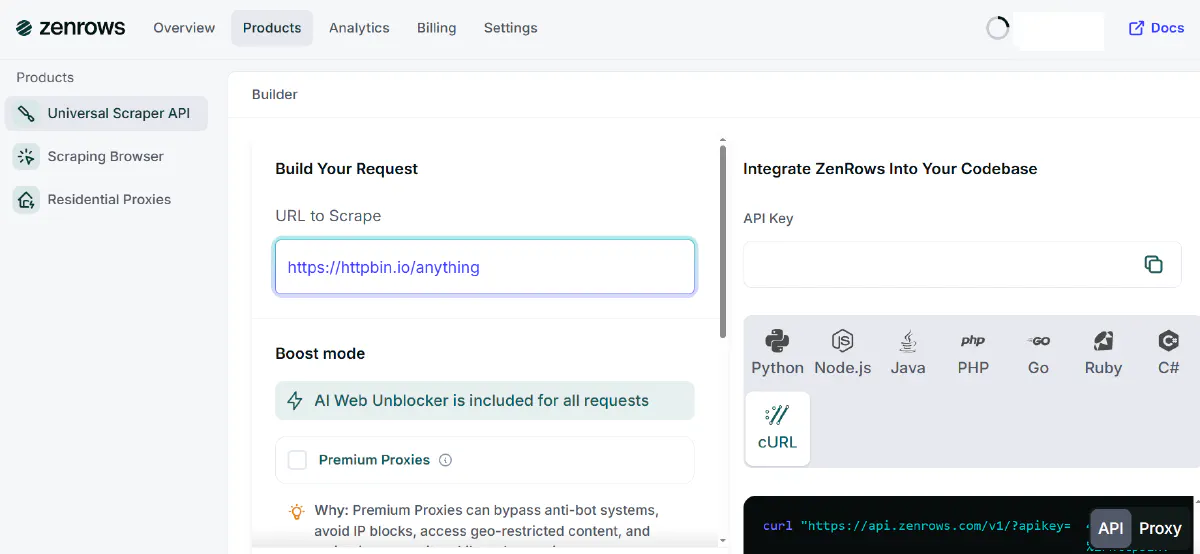
ZenRows offers faster response times than ScraperAPI with more predictable pricing.
It delivers 10.0s average response time with 92.64% success rate and no forced parameter traps that inflate costs. However, the $69 starting price is higher than ScraperAPI, and prices increase because render and premium parameters are forced for some domains, requiring 25 requests per call.
Pros
- Faster than ScraperAPI: 10.0s average response time compared to ScraperAPI's 15.7s
- No forced parameter traps: Unlike some competitors, it doesn't force expensive parameter combinations
Cons
- Higher starting price: $69/month starting price is more expensive than ScraperAPI's $49
- Forced parameter combinations: Some domains require both render and premium parameters, costing 25 requests per call
ScraperAPI vs ZenRows
ZenRows offers faster response times and better overall value for most use cases.
ScraperAPI has pre-built templates that can accelerate development for common patterns.
Both have similar success rates but different pricing models and speed characteristics.
5. Bright Data
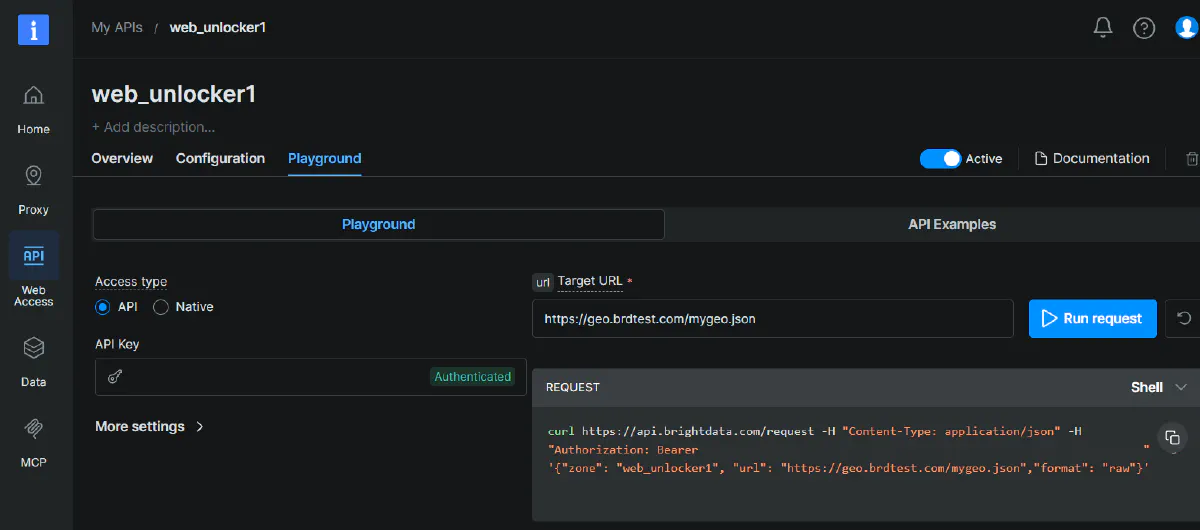
Bright Data delivers the highest success rate in the industry with completely predictable pricing.
It achieves 98.44% success rate with static pricing that removes guesswork on difficult domains. However, the static pricing model hurts on basic sites where you pay $1.50 per 1K even for simple pages, and there's no free tier available.
Pros
- Industry-leading success rate: 98.44% success rate is the best among all providers tested
- Predictable static pricing: $1.50 per 1K requests removes guesswork on difficult domains
Cons
- Expensive for simple sites: Static pricing means you pay $1.50 per 1K even for basic pages
- No free tier: Only offers free trials, no ongoing free usage like other providers
ScraperAPI vs Bright Data
Bright Data has significantly higher success rate and more predictable pricing for enterprise use.
ScraperAPI has pre-built templates that can speed up development for common use cases.
Bright Data is better for enterprise operations that need maximum reliability and can afford the static pricing model.
6. Octoparse AI
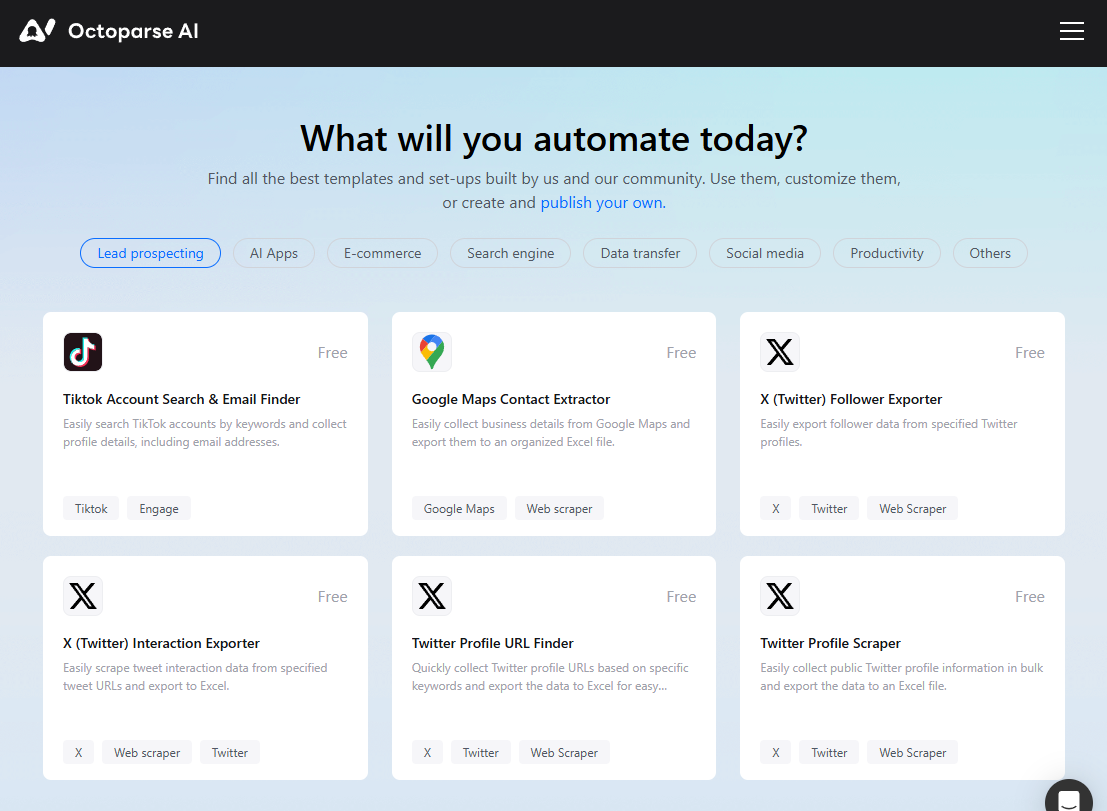
Octoparse AI takes a fundamentally different approach to web scraping compared to ScraperAPI and the other API-based tools on this list.
Instead of sending HTTP requests through a proxy API, Octoparse AI is a desktop-based RPA (Robotic Process Automation) tool that uses visual workflows and AI to automate browser interactions, including web scraping, data extraction, and cross-platform automation.
It's trusted by over 1.2 million users and is built by the team behind Octoparse, one of the most recognized names in the web scraping space.
Pros
- No-code visual builder: Drag-and-drop workflow editor with an AI Copilot that turns plain-English instructions into working automations
- Free forever core features: Unlimited basic workflows at no cost, with $5 in free AI credits for every new user
- Built-in CAPTCHA and anti-bot handling: Native CAPTCHA solving, OCR, and AI-powered text processing embedded directly into workflows
- Pre-built templates: App Store with ready-made templates for Amazon, Google Maps, TikTok, and more popular platforms
- Cross-platform automation: Connects web pages, Windows apps, and data files in a single workflow without needing separate APIs
Cons
- Windows only: Currently available only on Windows, which limits access for Mac and Linux users
- Desktop-based, not API-based: Runs locally rather than in the cloud, so it doesn't offer the same scalability as API-based scraping services for high-volume concurrent requests
- No independent benchmark data: Since it's an RPA tool rather than a proxy API, it doesn't appear in standard API-based scraping benchmarks
ScraperAPI vs Octoparse AI
Octoparse AI is best for users who prefer a visual, no-code approach to scraping and need to automate beyond just data extraction—combining web scraping with desktop apps, Excel processing, and other workflows.
ScraperAPI is better suited for developers who need a simple API endpoint to integrate into their existing codebase for high-volume, programmatic scraping.
If you're a non-technical user or need end-to-end automation that goes beyond raw HTML extraction, Octoparse AI's free plan is worth trying.
What to Pick?
- Scrape.do: Best overall value with unmatched speed, reliability, and transparent pricing
- Bright Data: Highest success rate and predictable pricing for enterprise operations
- ZenRows: Good balance of speed and reliability with reasonable pricing
- ScrapingBee: AI extraction capabilities for complex data parsing needs
- Oxylabs: Comprehensive proxy network for specialized geographic or use case requirements
- Octoparse AI: Visual no-code automation for users who need scraping combined with broader workflow automation
For most developers, Scrape.do offers the best combination of speed, success rate, and value with its 98.19% success rate, 4.7s response time, and transparent pricing starting at $29/month.

Lead Software Engineer












